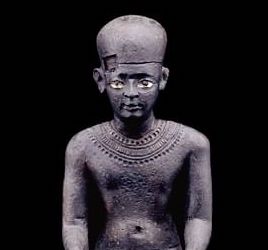Note: This question was posted by a user on the question-and-answer website Quora. The answer below was provided by Egypt Travel Blog there and is re-posted here for our readers’ benefit as well.
While this may seem like a funny question at first, it actually brings up some very good points about Imhotep that many people don’t know. And some of those points do make him seem almost god-like or other-worldly in a way.
For starters, for those who don’t know who Imhotep was, he was basically the right-hand man to the ancient Egyptian Pharaoh named Djoser, who founded Egypt’s Third Dynasty and kicked off what we refer today as the Old Kingdom era in ancient Egyptian History.
Djoser was the king who ordered the construction of the Step Pyramid at Saqqara (a little south of the more famous ones at Giza) and other temples and funerary monuments around it. As Djoser’s vizier and chief architect, Imhotep played an extraordinarily important role not only for Djoser’s reign and legacy but also for the future direction of grand Egyptian building projects.
Imhotep was so important to Djoser and Egypt at the time that he merited mentions by name on statues of the Pharaoh and in papyrus manuscripts recording Egyptian history and legends.
And it was out of some of these mentions of Imhotep, including tales of him possibly descending from the gods like the Pharaohs and also of him fighting against Egypt’s enemies with super-human powers, that some later began to view his origin and presence as “other worldly.”
As we know from history, however, stories and legends like these were often invented either to try to explain things that the ancients didn’t understand or which they revered, such as seemingly super-human talents like building pyramids, or to help justify their leaders’ and other high officials’ status as well above that of the ordinary population.
Indeed the ancient Greeks, who came to Egypt loooong after the time of Djoser and Imhotep, viewed the historical accounts of Imhotep as quite extraordinary for just a high official in the Pharaonic court and they elevated him to god-like status in their own translated accounts of Egyptian history.
So I hope that sheds a little more light on the mysteries surrounding Imhotep in ancient Egyptian history, his unusual level of importance, his impact, and the perhaps “alien” level of reverence that so many had for him both during his lifetime and long after his death, up to and including today.

